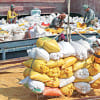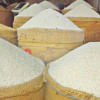Wheat import surges

Wheat imports grew four times in the first quarter of this fiscal year as businesses showed an interest in tapping into reduced international prices of the second most-consumed grain in Bangladesh.
Support from banks in opening Letters of Credits (LCs) for imports gave further impetus to the private sector to bring in an increased volume of wheat.
Bangladesh has to depend largely on the global market to meet its domestic requirement for wheat for household and industrial use.
The public and private sectors imported 13.28 lakh tonnes of wheat in the July-September period of the fiscal year 2023-24, which was a 259 percent year-on-year increase compared to the 3.69 lakh tonnes imported in the same period a year ago, according to Food Ministry data.
Private importers accounted for 12.8 lakh tonnes of total imports.
"We got good support from banks in the June-August months to open LCs and import an adequate amount of wheat. The grains have arrived," said Md Aminul Islam, managing director of Nabil Group, one of the largest importers of wheat.
Bangladesh's wheat imports fell to an eight-year low of 38.75 lakh tonnes in the fiscal year 2022-23 as a result of reduced consumption due to high prices and banks' sluggishness in opening LCs amid the US dollar crisis, importers said earlier.
Wheat prices increased on the international market following Russia's invasion of Ukraine in February last year and India's ban on shipments of the grain in May the same year.
Impacted by high international prices and reduced supply, the price of the grain soared locally since July 2022 and hit a record high of Tk 62.26 per kilogramme in December.
Prices began to drop in later months, but local consumers could not take full advantage because of reduced imports and high cost of the US dollar due to the depreciation of Bangladesh's taka, importers said.
In July, average retail prices of wheat flour stood at Tk 44.50 per kilogramme, according to data from the Food and Agriculture Organisation.
Globally, US hard red winter wheat price fell to $325 per tonne in the July-September period this year, down 18 percent from $394 a year ago.
The grain has been registering a downturn in prices since the beginning of 2023, according to the World Bank's commodities price data.
Importers source the grain from Russia, Bulgaria, Romania, Canada and Argentina, according to the officials.
"There is ample supply of wheat on the international market, especially in Russia. Going forward, the international market should remain stable. This is good news for Bangladesh," said Md Taslim Shahriar, deputy general manager of Meghna Group of Industries (MGI), a leading commodity importer and processor.
In August this year, the US Department of Agriculture (USDA) revised upward its projection for Bangladesh's wheat imports for the fiscal year 2023-24 to 60 lakh tonnes, a 3.4 percent increase from its previous forecast.
The agency also hiked its forecast on Food, Seed and Industrial (FSI) consumption of wheat in Bangladesh by 5 percent to 68 lakh tonnes in the current fiscal year, expecting higher imports, lower local prices, and higher domestic and industrial consumption of wheat flour, locally known as aata or maida.
The USDA estimated Bangladesh's FSI consumption at 65 lakh tonnes in the previous fiscal year 2022-23.
Shahriar said there would be adequate imports if they get dollars from banks to open LCs to import the grain.
Islam of Nabil Group said the rate of opening of LCs declined in September and October due to a dollar shortage in banks. This may affect supply in the domestic market and stoke prices, he added.
MGI official Shahriar said the price of wheat dropped on the wholesale market in line with the decline internationally. The wholesale price has fallen below Tk 40 per kilogramme, he added.
He said prices would fall further if local mills could get better prices of wheat bran, used as livestock feed.
Shahriar alleged that the price of the wheat bran is low as it is smuggled into the country from neighbouring India.

 For all latest news, follow The Daily Star's Google News channel.
For all latest news, follow The Daily Star's Google News channel. 








Comments